- Home
- Marie Rutkoski
The Hollow Heart Page 15
The Hollow Heart Read online
Page 15
In Lyannis’s desk, I find correspondence. I do not think the letters will contain anything interesting—they have been left about too freely. Ignoring them, once a quick glance confirms they are filled with lines of court gossip, written in a messy hand that left several blots of ink, I rummage about some more, looking carefully at her dresses in the wardrobe. Among the many secret codes my mother taught me for communication, using colored threads knotted in a specific way is one, but the embroidery on Lyannis’s dresses and gloves tells me nothing. Nor do I find evidence of other forms of secret communication, such as counters, which were used to translate Valorian military instructions, or a Caynish double ring, a device that contains two concentric rings, the outer engraved with a normal alphabet, and the inner ring containing an invented one. No such tools, or anything like it, are to be found, no matter how hard I look—and I did my job thoroughly, even finding the rather boringly expected false bottom in her trunk, which contained nothing but certain spicy drawings of herself, possibly meant for (or drawn by?) her fiancé.
But the very lack of anything suspicious makes me especially suspicious, so I return to those boring gossipy letters. And when I do, I notice that every single page contains little ink blots—flicks, here and there, that seem made by a faulty pen. But if the pen was so bad, why didn’t the writer exchange it?
I grin, in a good mood for once, and take some tishin paper from my pocket. Laying it over each letter, the tishin so sheer that I can see every written line through it, I painstakingly copy the blots.
Back in my suite, it takes me hours of studying the copies I have spirited away, leaving the originals safely in their place. At first, I see nothing but specks and dribbles of ink.
There is always a pattern, my mother says. A code is never actually secret. It cannot be, not fully, in order to work. It is secret only to those who cannot see the pattern at the heart of every code.
Eventually, the blots begin to make sense, and when they do, I sit back at my desk, my breath coming quickly.
Lyannis has received some news about the Cayn Saratu. They are being invaded by a foreign force no one has heard of. One island has already fallen to the invaders.
The invaders call themselves Herrath. They are led by a cruel, beautiful black-haired queen.
And the weapon they wield is magic.
* * *
“Exactly how did you come by this information?” my father says when I find him in the library, shut the door behind me, and tell him what I know.
“Etta, you know perfectly well how Amma trained me.”
“Against my better judgment. I wanted you to be free of all that: the conflicts, the intrigue—”
“There is no escaping it. I was born into it.”
Quietly, dangerously, he says, “Entering the ambassador’s suite was a violation of our hospitality to Valoria.”
“I didn’t violate our hospitality,” I say: a lie and not a lie. After all, Lyannis didn’t tell me I couldn’t come into her rooms.
He covers his eyes with one hand. His hands look like a peasant’s hands: rough, unlovely, strong. “Of course. She let you in,” he says wearily, and he is not being sarcastic. At first I don’t understand, and then I do. “Etta,” I say, just as wearily, “Lyannis and I are not lovers.”
“I would like, just once, to trust what you tell me.”
“May we please discuss what I discovered and not my methods of discovery?”
He shrugs. “I will raise the issue with Verex and ask if he needs Herran’s help. Otherwise, there is nothing for me to do about a Caynish invasion, save to monitor it.”
“It’s almost as if twenty years of peace has made you lazy.”
His eyes glow with sudden, silver fire. “There is nothing about this news that demands Herran’s involvement, or even Valoria’s. The Cayn Saratu is an independent nation and they are not fond of us. If we involve ourselves, it might look as though we hope to establish ourselves as new imperialists, under the guise of friendly aid. If Verex steps in, it will embolden the Valorian rebels in the Cayn Saratu who are eager to see those islands be once again part of Valoria. This is a mess, and we are well out of it. Verex knows this, or he would have raised the issue with me himself. Herran is in a delicate enough position as it is. My duty is to my country first, always.”
“Etta—”
“Sid, you are not Kestrel. You need not try to take her place.”
My face burns. “But she is sick, and you are alone, and I want to help.”
His expression softens, and I see, suddenly, how he will look ten years from now. His eyes look old—gray as pewter, as deep mist—and sad. “I miss her,” he whispers. “Does that make sense, to miss someone who isn’t yet gone?”
I remember Nirrim sleeping next to me, her palm on my shoulder, and feel like I have been wading out into the ocean along a sandbar that has dropped away without warning, a cold darkness opening up beneath me, fathoms deep. “I think we can’t help what we miss, or how we miss it, and the god of the lost knows it.”
He swallows. “I’m not sure you can understand what it means to know you have placed your heart in the most fragile of vessels, which could break at a moment’s notice, and destroy you, and still you would choose this. You would choose this person, over and over again, for as much time as the gods allow, even if that time is hours and not years.”
Shame tightens in my chest, because I do understand this, otherwise I wouldn’t be so afraid of loving someone so much. Even though I chose to leave Ethin for my mother’s sake, even though Nirrim refused to come with me, I could have promised to return. Maybe I would have, if she had allowed me any hope. Do you not love me like I love you? I asked her. Won’t you come with me? The pain of her answer drove me out the door and down the street to the wharves, where my docked ship waited.
Not just pain, I realize now. Fear, too.
“Sid,” my father says, “do you really want to marry Prince Ishar? You met once on your twelfth nameday. You barely know him.”
I shrug. “One man is as good as another.”
“But you don’t want to be with a man. Do you?”
“Ishar is not just any man. He’s the crown prince of the world’s most powerful country, since the Valorian Empire’s fall.”
“You have never cared about political power.”
“Can we please not pretend that this marriage isn’t something you and Amma want?”
My father stands and walks to the bookshelves, his broad back to me as he traces the richly bound books, the leather of the spines darkened with age. His fingers rest atop the spine of a poetry book I have seen him hold many times as though it were as delicate as a soap bubble. Once, alone in the library, I took it from the shelf, to understand its worth to him. When I opened the book, I saw that the flyleaf was inscribed with ink faded by time. To Arin, it read in old-fashioned script, From Amma and Etta, with love.
His fingers lift and he moves away from the poetry book to pull aside a heavy gold curtain fringed with red. Outside, a green storm is brewing. The sky looks viridian. Wind tears orange leaves from the trees and whirls them over the dry lawn. When he turns to face me again, his expression is hesitant. “I want you to be safe,” he said, “and I want you to be happy, but maybe you can’t be both. A marriage alliance between Herran and Dacra will make you safe, because it will make our country safe. Will it make you happy?”
“As Amma said, I can always have lovers on the side.” She presented the possibility of marriage to me on my twentieth nameday, a few months before I fled Herran. You do not have to do this, she said, but would you want to? You could still take your usual liberties.
I saw myself suddenly as she must, as the entire court did: an inveterate rake. Well, I deserved the reputation. But her question made me heart-sore, because she saw me only as everyone else saw me, and could see nothing more. Feral with vulnerability, too proud to correct her, I said, Yes, why not?
“Doesn’t every ruler get a moniker?�
�� I say to my father. “Sidarine the Philandering Queen. Sidarine, Queen of the Hollow Heart. Something like that.”
“I think you don’t really want this marriage.”
“My kind of philandering isn’t going to produce bastard children, so the royal line would be secure. Plus, Ishar can have his own dalliances without my interference. The Dacran-Herrani alliance will be cemented. Seems like a good deal for all concerned.” The storm darkens in the window behind him. The sky looks as green as a summer forest. Thunder rumbles. It feels like the storm is inside my chest. I say—my words sudden, accusatory, surprising myself in their directness—“I know you don’t like that I want women.”
“You misunderstand. I dislike how you treat them.”
“Because you are so perfect, and honor Amma with every bone in your body.”
“I am not perfect. I haven’t always been good to women.” He smiles ruefully, to see that he has stunned me. “I misled some of them.” My eyes must be as round as the moon. “This was before I knew Kestrel loved me.”
“How … many?” My voice breaks like a boy’s.
“Two. Maybe three.”
“What happened?”
“It was so long ago.” He spreads his hands helplessly in the Herrani gesture of skepticism, possibly because he cannot believe his memories are real. “I was careless. When I was enslaved, another woman on the general’s estate was kind to me. Her name was Lirah. She was pretty, but I didn’t even notice her, didn’t realize I had let her believe I returned her feelings. And then there was Inisha—”
“Queen Inishanaway?” I feel uncomfortable in an almost itchy way. I don’t really enjoy this particular glimpse into my father’s past, but I am also fascinated. “You bedded the Dacran queen?”
“No! I kissed her. She wanted me, and I believed your mother didn’t, and that I had to try wanting someone else. My love for your mother felt like a sickness I had to cure.” He closes his eyes for too long a moment. “I used Inisha. I still regret it.”
“It was just a kiss. You are making too much of this.”
“You make too little of it.”
“You said three women. Or: maybe three.”
“There was a Valorian bookkeeper I made a bargain with. She hoped for more than a business transaction. I let her know I wasn’t interested.”
“That’s it? Your entire list of women you have supposedly mistreated? That’s nothing!”
“To you, perhaps.” He stands so stiffly, rain streaking the window that frames him, that I can tell he is made uncomfortable by this conversation, too. His shoulders are squared. He stands as if in judgment. He looks as noble as a sculpture in the city square.
I say, “If I felt as guilty as you did about every selfish kiss, every misunderstanding, and every—what exactly do you think you did wrong with that bookkeeper?—every time I turned someone down, I would have to lock myself in my rooms and never creep forth, for shame of my sins.”
“That is my point, Sid.”
“You are saying that your real problem with me is not that I want women, but that I can’t stay true to one.” A slow irritation grows inside me. “You advise me not to treat women lightly, as playthings, but rather to be faithful, to find a love blessed by the god of souls, to have what you and Amma have.” As I speak, my frustration becomes clear, and my father’s face changes as he begins to understand why, even before I say it. “But marriage is between men and women, Etta, in every known country in this world, including Herran. What you want for me is impossible. And you, a king, have helped make it impossible by your inaction.”
He looks stricken. “Sid, I am sorry. This never occurred to me.”
“Why not, I wonder? Because you thought I would change? Grow out of it? Or because your love with Amma is so perfect you can’t imagine a different way?”
“I will make such marriage into law.”
I shake my head. “There is no woman I plan to marry. I am already engaged, and will keep that engagement.”
“I will write the law anyway. I should have done it long ago. For everyone, not just you.”
Such a law feels too late, too long after my habits and needs formed. Sid the sly, they call me. As bad as a boy. You are an apple, Sidarine. Only now do I realize that I might not be this way if it hadn’t always been clear that there would be no story for me, no tale wrapped like a present that gets to be opened again and again to reveal the kind of love my parents have, the kind that everyone sighs over, because it is forever. The kind that makes a family. Who would I be, how would I have acted, what might I have said to Nirrim, if I had ever believed that kind of story could be mine?
I cannot know.
“It’s a good idea, Etta,” I say heavily. “You should write the law.” Are you supposed to thank someone for doing the right thing, if it is years too late?
The rain sheets down the window. Ships will stay docked in the bay throughout autumn and winter.
My father comes close. My eyes burn, but I feel myself standing the same way he did a moment ago, like my bones have been replaced with something harder, a pride as strong as steel. “I won’t question you again,” he says.
Is that what I want? “You said you want me to be safe, and happy. What if I can only be one, and you had to choose?”
He kisses my brow. “I don’t know,” he whispers into my hair. When his voice falls low like this, I can hear the singer in him.
The sound of the storm is loud, and I still wear my soft boots. When I walk to the door, I am as soundless as a ghost. Just before I reach the door, he speaks again: “I would choose to let you choose.”
* * *
As I walk through the house to the kitchens, my father’s words still ringing in my mind, I realize that we forgot too quickly the news from the Cayn Saratu. We didn’t even discuss the fact that the invading force was led by a beautiful queen. Herrath has no queen. The island is ruled by the Lord Protector, a man elected to a lifetime position by the Council, also men. Has the Lord Protector been overthrown? Could the High Kith have chosen someone else to rule in his place?
But the coded report I read also described magic used as a weapon. As far as I know, only people of Nirrim’s kith possess magic, and it is harvested by the Council through imprisonments and blood drawn as payment for made-up crimes, like dressing too nicely for one’s social status. Could it be that the Half Kith rose up against their oppressors and chose someone to lead them?
I think of Nirrim, but I can’t imagine her as this warlike queen. She was determined, yes, to right the wrongs perpetrated on her people. And strong. I do not doubt she could lead an army … but not to colonize another country. Not to wield magic as a weapon. Nirrim was too good-hearted for that.
Worry grows within me, as spongy and creeping as moss. This news of a deadly queen unsettles me. I wonder what Nirrim is doing now, if she is at the mercy of this queen. I hope she is safe.
Do you not love me like I love you? I asked her. Won’t you come with me?
But her answer was no, and my place is here. Finally, I understand what other women meant when they accused me of breaking their hearts. I can feel the pieces of my love split within me like a glass flower, blooming to pierce me from the inside. It closes only to open again. Sailing to Herrath to investigate the rumors would be stupid. Impossibly painful. Even if my mother were well, to see Nirrim again would shame me. Who would beg for something that cannot be given?
I put Nirrim from my mind, and go to prepare my mother’s meal.
* * *
My mother is awake when I bring her dinner. She is even on her feet, neatening her bedchamber, returning Bite and Sting tiles to their velvet bag, pinching dead petals from flower arrangements. The long dress box lies open on the table, its undone ribbon as elegant as a swan’s neck. Tishin paper hides the box’s contents. My mother wears a simple silk day dress from a few seasons ago, as pink as a blush on fair skin. I think she has chosen it to make herself look healthier. With her neatly braided
hair; her small, determined movements; and the soft glow of her dress, she looks like a golden-headed flower, not like someone who has been exchanging whispers with the god of death. I notice the hollows beneath her eyes, and an edge of exhaustion to her burst of energy. Still, I am hopeful, and smile when she notices me.
“I am glad you’re here,” she says, but doesn’t stop her task of making the bed, and fluffing the pillows so they don’t show the dents where her head rested.
“Amma, someone else can do that.” Although I forbade the servants from bringing her food, they still clean her rooms as usual.
“I want to be myself again,” she says. “I must be.”
“No one expects you to be. You should rest more.”
She shakes her head, and I decide definitely not to tell her about the news from the Cayn Saratu. It will only give her purpose to get up to her usual tricks, when what she needs is to recover. She asks, “Will you help me into my new dress?”
I pull aside the tishin paper to reveal a brocaded dress, as red as the leaves outside, its fabric rich enough for winter. I am surprised at my mother’s eagerness. She cares little for fashion beyond how it serves her purposes. To her, a beautiful dress is merely a tool. “Why did you order a new dress? How can you even have been fitted for it? You are a convalescent.” I draw out the word, probably annoyingly, to stress my frustration and worry. “You are supposed to rest.”

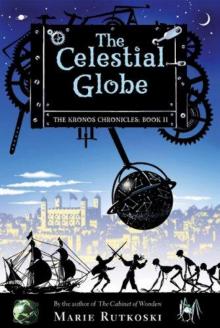 The Celestial Globe
The Celestial Globe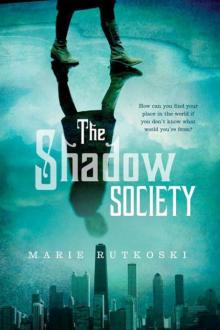 The Shadow Society
The Shadow Society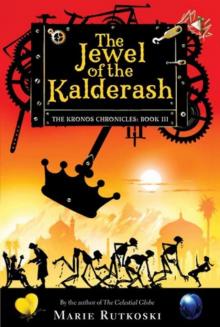 The Jewel of the Kalderash
The Jewel of the Kalderash The Winner's Kiss
The Winner's Kiss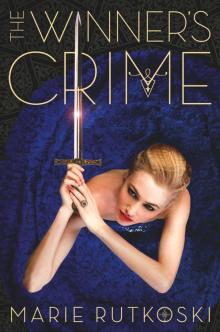 The Winner's Crime
The Winner's Crime The Winner's Curse
The Winner's Curse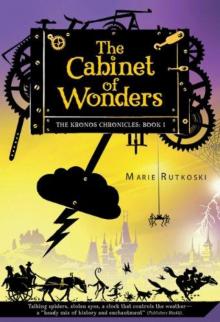 The Cabinet of Wonders
The Cabinet of Wonders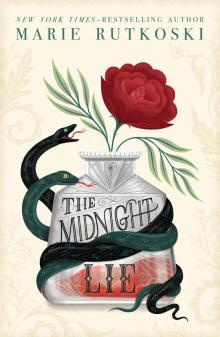 The Midnight Lie
The Midnight Lie The Hollow Heart
The Hollow Heart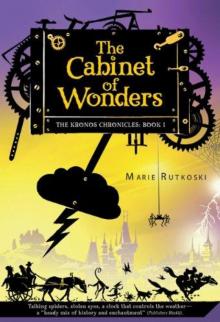 The Cabinet of Wonders: The Kronos Chronicles: Book I
The Cabinet of Wonders: The Kronos Chronicles: Book I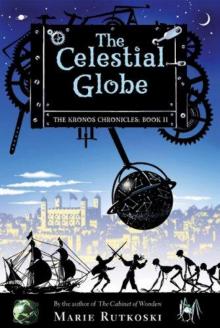 The Celestial Globe: The Kronos Chronicles: Book II
The Celestial Globe: The Kronos Chronicles: Book II